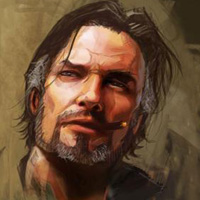
Jim Raynor
CBUB Wins: 2
CBUB Losses: 0
CBUB Ties: 0
Win Percentage: 100.00%
Added by: Lemming
Read more about Jim Raynor at: Wikipedia
Official Site: Blizzard Entertainment
James Eugene "Jim" Raynor is a fictional character and a major protagonist in Blizzard Entertainment's science fiction StarCraft series. Raynor is a predominant character in the science fiction real-time strategy video games StarCraft and Brood War, and is the player character in StarCraft II: Wings of Liberty. Outside video games, Raynor appears in the novels Liberty's Crusade and Queen of Blades, while his backstory is explored in the novel Heaven's Devils. Robert Clotworthy voices the character in all video game appearances.
Created by Chris Metzen and James Phinney, Raynor is loosely based on a character of the same name in the 1991 film Rush. Metzen conceived Raynor to represent the ordinary man in a series populated with politically-motivated characters. Raynor's physical appearance was designed by Metzen himself. A Terran in his early thirties, Raynor is a former soldier and outlaw who eventually becomes a marshall on a backwater colony world. Raynor joins Arcturus Mengsk's revolution against the oppressive Confederacy of Man but becomes disillusioned with Mengsk's genocidal tactics, forming his own paramilitary group to challenge Mengsk's tyranny.
The character has received a positive critical response; Raynor's depiction in StarCraft and Brood War was praised for its character depth and the quality of Clotworthy's voice acting. One survey by GameSpot put Raynor as one of the top ten heroes in video gaming.
The character of Raynor was originally devised by Chris Metzen with his depiction as a rough-living and dangerous man developed through various pieces of concept art by Metzen. In an interview, Raynor's voice actor Robert Clotworthy—for whom Raynor was the first video game character he had the opportunity to voice—cited one piece of this concept art in how he decided to voice the character. The art, showing Raynor on a hoverbike and outfitted with futuristic weaponry, gave Clotworthy the impression that as Raynor was someone people "wouldn't mess with", he would not have to raise his voice as "other characters [would] shut up and listen" or face the consequences.
CBUB Match Record:
| Result | Opponent | My Score | Their Score | |
|---|---|---|---|---|
| Win | Kane | 17 | to | 5 |
| Win | Visser Three | 6 | to | 5 |
No Fantasy Draft Records Available
